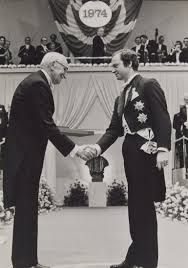Tweet
 To commemorate the 50th anniversary of the ceremony in Stockholm in which Hayek was awarded the Nobel Prize, the Institute of Economic Affairs has republished Hayek’s Nobel lecture (“The Pretence of Knowledge”), along with three new essays on Hayek. These essays are by (in the order in which they appear) Bruce Caldwell, Peter Boettke, and me. An excellent Foreword is supplied by Kristian Niemietz.
To commemorate the 50th anniversary of the ceremony in Stockholm in which Hayek was awarded the Nobel Prize, the Institute of Economic Affairs has republished Hayek’s Nobel lecture (“The Pretence of Knowledge”), along with three new essays on Hayek. These essays are by (in the order in which they appear) Bruce Caldwell, Peter Boettke, and me. An excellent Foreword is supplied by Kristian Niemietz.
Here’s a slice from each of the essays that appear before Hayek’s lecture:
Niemietz:
While we see this anniversary as a cause for celebration, we nonetheless do not necessarily intend this publication to be just an exercise in backslapping for self-proclaimed Hayekians. Rather, we hope that it will be just as valuable to non-Hayekians or even anti-Hayekians who, even if they end up disagreeing, nonetheless wish to inform themselves about the ideas of a man who, for better or worse, was clearly a towering figure in the history of economic thought.
Caldwell:
Hayek’s concerns go beyond economics. The danger he sees is that the public will come to expect science to be able to do more than it can in the field of human affairs. He specifically mentions the ‘enormous publicity’ given to the Club of Rome’s report on ‘the predicament of mankind’ in the 1972 book The Limits to Growth, and the lack of media attention to the devastating criticisms that had been given to this report by ‘competent experts’. Hayek’s fear was that a false image of the overwhelming power of science, joined with progressive views about how to reshape the social world, all reinforced by uncritical media attention, would bring about policies that would end up doing great harm. His fears would only be reinforced by the very public debates among professional economists over such issues that would soon take place.
Boettke:
The market process should be characterised as one of adaptation and re-adaptation to constantly changing circumstances and presents to economic actors what is called a ‘wicked learning environment’ – one where the parameters are relatively free. What computers can do is process most efficiently information in ‘kind learning environments’ – one where the parameters are fixed. In such a world, the algorithms that are finite and known (even if absurdly numerous) just need to be sorted with speed. Computers can do that – e.g., chess. But in those ‘wicked environments’ the adaptations and adjustments require a skilful adjudication between a variety of past experiences and the exercise of judgement over imagined responses, and through some combinatorial thinking creative and novel adaptations emerge to tackle the problem at hand – e.g., playing soccer. Computers can expertly play chess, but they only badly and without much agility play soccer. Is that a technological question or an essential element associated with comparing action within a world of fixed parameters with action within a world of free parameters? The Hayekian argument was that this was not just a technological issue but an essential one related to the nature of the knowledge to be utilised by the actors to effectively execute their plans. A world of creativity and novelty or, in other words, a world of entrepreneurship, cannot be reduced to algorithms. Modern technology can be an extremely useful tool for individuals in aiding their competitive activity on the market (such as Walmart), but these tools are not substitutes for the market process and the role that prices play in guiding us, the role that profits play in luring us, the role that losses play in disciplining and the role that the pattern of resource ownership plays in incentivising us. The arket process is a continual process of adaptation and adjustment guided by price movements, and this process is made possible by the liberal institutions of property, contract and consent.
Boudreaux:
The ability in textbooks and in academic seminars to describe theoretically what market imperfections look like and to explain how a godlike state would ‘correct’ these imperfections is, frankly, child’s play – or, at least, sophomores’ play. But it is pretentious to suppose that flesh-and-blood human beings’ ability to offer such theoretical descriptions thereby supplies these mortal creatures with the ability to gather all the detailed knowledge that is necessary to render these descriptions as practical guides to public policy. Therefore, to oppose state actions that are meant to ‘internalize externalities,’ or to object to industrial policy that promises to create ‘the industries of the future,’ is not to oppose science. Quite the contrary. It is to rationally recognise the limits of human knowledge and to establish as a matter of science that the likely best means of ordering humanity’s material affairs is through the decentralised market economy rather than through government commands and controls. Do not forget that Hayek, 29 years before he won the Nobel Prize, offered the still-definitive explanation of how a decentralised market price system makes remarkably effective use of the immense amount of knowledge that is dispersed among countless different human minds (Hayek 1945 [“The Use of Knowledge in Society“).